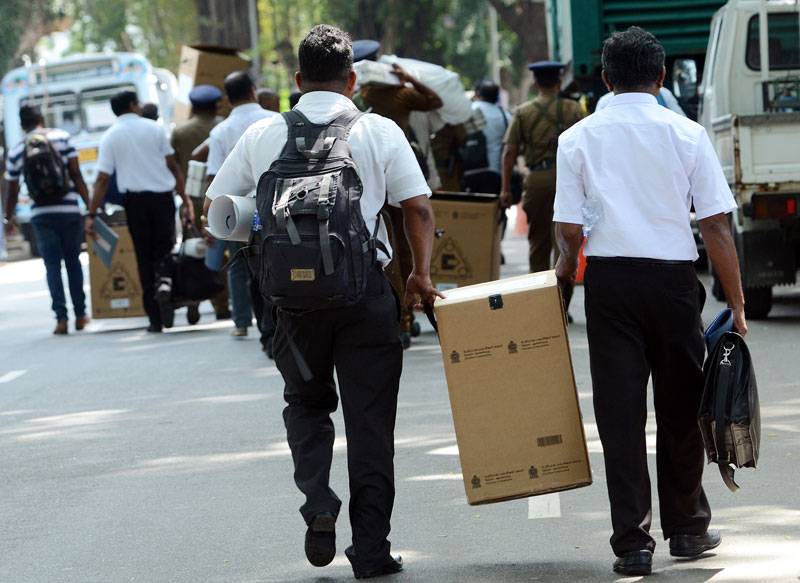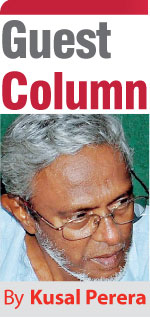Wednesday Feb 18, 2026
Wednesday Feb 18, 2026
Wednesday, 31 January 2024 01:49 - - {{hitsCtrl.values.hits}}

Despite the anger spat with hatred in most uncivilised language in social media platforms, how the voter selects candidates for preference voting does not change at elections – Pic by Shehan Gunasekara
 On last poya holiday, the first full moon this new year 2024, I was woken up pretty early in the morning by the tinkle of a WhatsApp message on my mobile phone. One from an expatriate Sinhala-Buddhist patriot, an old-time pal of mine. It was a hurried short message. His excitement and joy no less ingrained. “Macho, Good news for all…did you hear it? That mad thug from Puttalam had died in an accident on Katunayake Expressway… Just past midnight” read his message.
On last poya holiday, the first full moon this new year 2024, I was woken up pretty early in the morning by the tinkle of a WhatsApp message on my mobile phone. One from an expatriate Sinhala-Buddhist patriot, an old-time pal of mine. It was a hurried short message. His excitement and joy no less ingrained. “Macho, Good news for all…did you hear it? That mad thug from Puttalam had died in an accident on Katunayake Expressway… Just past midnight” read his message.
His excitement and joy were no less indecent and vulgar than the man he called a “mad thug”. Many things ran through my mind with that message and made me sit at the computer instead of getting back to sleep again. A short response in Sinhala, perhaps the first on State Minister Sanath Nishantha’s tragic death was thus shared with some of my contacts on WhatsApp. Here in English is the first part of it as entry to an explanatory note on “thugs, death and decency”.
“President Premadasa was killed by a suicide squad member of Prabhakaran’s LTTE on May Day 1993 that brought people on to the streets lighting crackers and eating kiribath. Prabhakaran seen as the saviour. On 2009 May 19 when President Mahinda Rajapaksa announced to the nation, the war was victoriously concluded with the total annihilation of the LTTE including its leader Prabhakaran, the South was on the streets again lighting crackers and cooking kiribath on the streets. This time, for killing Prabhakaran. President Rajapaksa was virtually crowned their King of “Tri-Sinhale”. Last year, sometime in mid-2023, web media frauds ran a developing story for over 03 or 04 days about former President Mahinda Rajapaksa being treated in an intensive care unit of a private medical hospital in Colombo, finally hinting he has bid his final farewell, that in social media was shared by thousands in no time with uncontrolled glee and with comments that surpassed all limits of indecency and vulgarity.”
How did this rejoicing over death begin?
How and where did this rejoicing over death begin in Sri Lanka? First PM of independent Ceylon D.S. Senanayake had an accidental death in March 1952 falling off his horse, but no one rejoiced. Not even plantation labour numbering nearly 800,000 made Stateless by D.S. as PM in 1948. Assassination of PM Bandaranaike in September 1959, was no joy for the Tamil people despite Bandaranaike denying their right to equal treatment in State affairs, with Sinhala made the only official language in 1956. None rejoiced over the death of former President J.R. Jayewardene in 1996, the man who crushed the 1980 July strike dismissing 43,000 public employees in a single lot.
What then led to rejoicing over the death of President Premadasa for the first time? Close observation of political developments shows in the North-East with armed politics taking over, LTTE took control of Tamil nationalism by eliminating their political opposition, labelling them as “traitors” or as “informants” of the Sinhala State. Known as “lamp post killings” anti-LTTE activists killed were hung on lamp posts with a poster calling him an “Informant” or a “Traitor”. That chapter of revenge killings in Tamil politics came to an end with the end of the war.
In Sinhala South the story seems different. Sinhala South is where all Southern political parties compete for power on Sinhala Buddhist votes. The Indo-Lanka Accord of 1987 July that brought Provincial Councils (PCs) with a degree of devolved power to provinces and the Indian Peace Keeping Force (IPKF) stationed in N-E was projected by the SLFP as undermining the supremacy of the Sinhala “Unitary State”. This was capitalised by the inherently anti-Indian JVP in their second and savage insurgency during 1988 to 1990 to destabilise the UNP government. Their savagery was thus focussed on local activists who stood for PCs instead of challenging the Government. Murder of political opponents and “Kangaroo courts” became their only political activity.
Every one murdered by JVP hit squads were denigrated and insulted with conditions laid down on last rites. No Buddhist clergy and final respects were allowed. No hearse allowed. Coffin should not be lifted above knee level of those who carry it. No cremations allowed and burial should have the earth levelled completely instead of leaving a heaped mound. There were instances, where other “left” political parties challenged JVP orders by publicly ignoring them. Yet the social psyche of insulting the dead had seeped into social segments closer to semi urban anti-UNP politics, with the UNP government of President Premadasa accused of resorting to “jungle law” in brutally eliminating the JVP insurgency and its leaders Wijeweera, Gammanpila et al.
Two and a half years after the JVP was brutally crushed the anti-UNP wrath in Sinhala South came out at the death of President Premadasa in 1993 May with crackers and kiribath. It was well garnished by the Athulathmudali-Gamini Dissanayake split that was fiercely anti-Premadasa. Thereafter people came out again in massive numbers, this time with State patronage in 2009 May to celebrate the death of Prabhakaran at the conclusion of the near 30-year war. Celebrating the death of Premadasa and Prabhakaran then was with no social media platforms as at present. More recently, Rajapaksas with massive corruption and fraud were hyped as the sole reason for the ongoing major economic bankruptcy, but the “assumed death” of Mahinda Rajapaksa in social media could not spew out enough hate to make any impact among people.
Insulting the dead politically manipulated
Denigrating and insulting the dead has been politically manipulated. Sanath Nishantha’s tragic death was also immediately showered with memes, posts and comments in social media using language that was horribly vulgar than any time before. Some in fact had Mahinda Rajapaksa tagged as well. Yet outside social media there was no public participation in celebrating Sanath Nishantha’s death. While there were negative sentiments, justifiable and heavy blame and condemnation within urban middleclass circles of Sanath Nishantha’s thug life in politics, social media campaigns apparently had little impact on large crowds that gathered along roadsides to see Sanath Nishantha’s cortege on the way to his residence in Arachchikattuwa.
There were no insulting and hate in Arachchikattuwa in Puttalam district that knew him as a confirmed thug. They had no qualms promoting him from PS to PCs with large preferential votes. In 2013 he secured the highest number of preferential votes with nearly 63,000 preferences. In parliamentary elections thereafter, he was elected with large preferential votes that in 2015 August counted over 80,000. He carried a string of accusations on crimes committed and many arrests, his voters were not interested in.
Where do insulting and celebrating the dead in social media come in? Are they irrelevant to Arachchikattuwa and Puttalam district voters? Are they different to all other voters in other districts? The simple answer is “NO”. For 90 plus years from colonial Ceylon to present Socialist Democratic Republic of Sri Lanka, all voters in every district alike, did not use the vote for what it should be used for; to elect a government for development of the country as an inclusive, secular nation. Their purpose of using the vote was always extremely selfish. Either to find employment, a promotion in service or for a foreign liquor or sand mining permit, a building construction contract, appointment to a director board or chairmanship in a state corporation or a diplomatic posting. For all or any of it, the choice of a candidate is almost always on caste, ethnicity or religion.
Petty and selfish needs
Elected MPs and governments for petty and selfish needs of the voter are therefore not socially bound to establish good governance nor socio-economic development. With poverty and crimes increasing in failed economies, frustrations in urban and semi-urban societies lead to anti-Government sentiments vented out with anger in social media platforms. Despite the anger spat with hatred in most uncivilised language in social media platforms, how the voter selects candidates for preference voting does not change at elections. Sanath Nishanthas thereby being cloned in different districts and would be that even in the next election. Hate campaigns created in vulgar language against selected politicians in social media will not be any solution. One indecent political culture cannot be replaced for the better with an equally or more inhuman vulgar culture.
The next election the opposition is demanding therefore should come with what I have said many times over even on these pages; an intensive grassroots campaign to make the voter aware his or her responsibility is a social responsibility. His or her sole responsibility at an election is to vote for a political party with a well laid out development program for poverty and crime-free inclusive, secular country.
A week ago, President Wickremesinghe has also requested political leaders to present their “development program” before elections, he himself failed to present at all elections. It’s ironic he has not even made public his national development program agreed with the IMF in detail for social dialogue. Yet his request for development programs from party leaders is certainly the most valid proposition by him and I wish professional and academic associations would fall in line, requesting development programs in detail from political parties. That would be the only way to avoid elections that vote for the likes of Sanath Nishanthas and instead would cultivate a new civilised culture against hate and revenge politics.